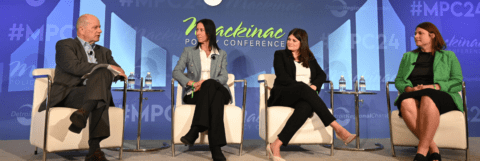As the global manufacturing ecosystem transitions from traditional ICE vehicles to EVs, the need for high-tech talent is becoming increasingly urgent, not just in Michigan, but across the globe. This session, hosted by SME, examined perspectives from industry, academia, and national workforce organizations on developing a qualified workforce to support the electric vehicle ecosystem in Michigan.
The War for Talent
Bill Ford was recently quoted as saying that Ford Motor Company is in a “war for talent.” Ford’s Manager of Workforce Development, Ann Thompson, said they are not alone, adding, “There is an opportunity for everyone to have better strategies for how we upskill and reskill people for the EV world.”
One part of her approach is tailoring outreach programs for the employed, unemployed, and students to bring them into the world of advanced manufacturing. Because technology is developing at such a breakneck pace, developing the talent pipeline through partnerships with K-12 schools and community colleges is no longer a “nice to have,” it’s a “need to have,” she said.
The K-12 System Will Play a Critical Role in Supporting the EV Talent Pipeline
“So many of our issues come back to our broken K-12 system,” Nolan Finely, Editorial Page Editor for The Detroit News and Contributor for One Detroit at Detroit PBS, claimed. Thompson then shared her astonishment at the number of individuals who are not eligible to join the workforce because they lack a high school diploma or equivalent. “If we can focus on that group, that’s a group of potentially talented individuals that are just off the market,” she shared.
Influenced by their parents’ experience with dirty and loud factories, many students who graduate don’t see a place for themselves in the industry.
According to Jeannine Kunz, Chief Workforce Development Officer at SME, “our career counselors play a very critical role in our country, one that we often forget about.” Because of their access to younger generations and their ability to influence, school career counselors have an opportunity to change the perceptions of automotive careers and show them that, “this is not your father’s auto plant,” as Finley described it. But first, they must change their own perceptions.
Another critical action is creating opportunities for students to experience the jobs and workplaces for themselves. “If they could see that next step, I’m convinced we would have more people who complete high school and go onto careers.” To this end, Ford partnered with SME on the Electric Vehicle Production Technician (EVPT) program in Tennessee, which Thompson believes is easily transferable to Michigan. Earlier this month, MichAuto hosted a trip to Nashville for community colleges and businesses from Michigan in pursuit of collaboration and inspiration for how to bring the program home.
How Federal Policy Can Help Employers Find Talent
“One thing we know as lawmakers is that workforce development is infrastructure,” said Rep. Haley Stevens, “we cannot have a successful future if we are not making coordinated and strategic investments.” She suggested that it doesn’t all have to come from the federal level. Michigan can set the stage at the state level by growing initiatives such as the EV Workforce Hub and the Global Epicenter for Mobility.
Powered by the energy conjured by their rapid industrial response to the COVID-19 pandemic, the automotive industry has entered “hyper-acceleration mode,” continuing to innovate while government matches them through the public-private partnership model. “It is going to be American industrial policy that wins the day for us,” Stevens concluded.
A big roadblock for getting these innovators the talent they need is the United States’ immigration policy, which is, “stuck in the last century,” according to Stevens. She joked that we should be “stapling green cards to degrees,” because we are training a lot of talent here but losing them to other countries soon after.
Overall, Stevens stressed the importance of urgent action. “Do we get it right every time?” she asked, “no, but we can’t just sit here and do nothing.”





